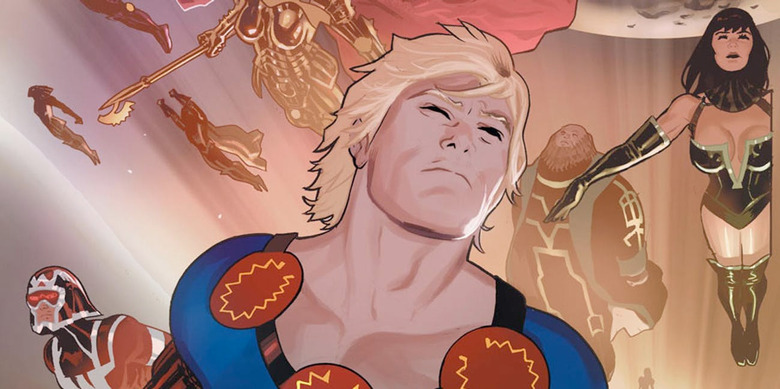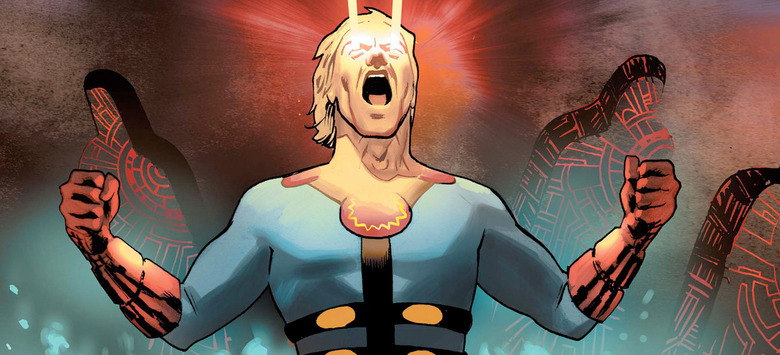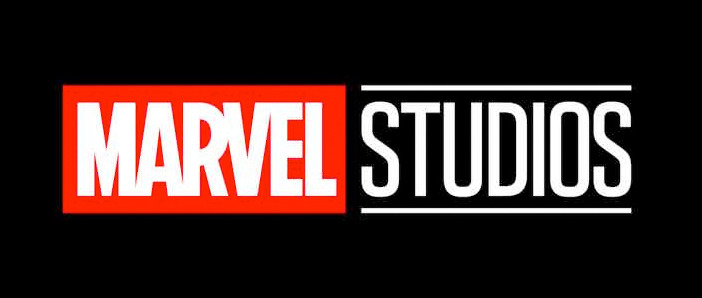Marvel's Next Big Thing: What You Need To Know About Chloé Zhao And 'The Eternals'
When Marvel was eyeing Chloé Zhao to direct Black Widow back in April (among others like Amma Asante and Deniz Gamze Ergüven; the job eventually went to Cate Shortland), the pairing seemed like a long-shot. A unique voice like Zhao's doesn't immediately seem like it would gel with the Hollywood studio system. We've seen Edgar Wrights and Lord & Millers a-plenty — Ant-Man and Solo would go on to be directed by Peyton Reed and Ron Howard respectively — but on the other hand, Disney's own recent efforts like Black Panther (Ryan Coogler) and Star Wars: The Last Jedi (Rian Johnson), which both fit the mold of blockbuster filmmaking while allowing their creators a personal stamp, make speculating from this side of the studio gates a fool's errand.
When it was announced on Friday that Zhao would not only be tasked with a Marvel movie, but with cosmic opera The Eternals of all things, reactions were understandably mixed. Some were enthusiastic, while others lamented a distinct eye being lost to the Marvel machine (this writer is optimistic, albeit cautiously) because alas, speculation is all we have in this 24x7 Disney-dominated news cycle. One can hardly begrudge anyone their extreme responses — for every Patty Jenkins leaving Thor: The Dark World due to creative differences, there's Patty Jenkins knocking Wonder Woman out of the park and negotiation a seven-figure salary on the sequel — so the best we can do is look at the what's what and the who's who and hope for the best behind-the-scenes. Every creative partnership is different, after all.
Who is Chloé Zhao?
It's been almost a year to the day I watched The Rider at the New York Film Festival, and I'd be hard-pressed to say I've seen a better film since. Zhao's debut feature Songs My Brothers Taught Me was one of the best films of 2016 (both films tell modern Native American stories in ways we seldom see on-screen) and her next project sounds equally potent: the story of Bass Reeves, the first Black U.S. Deputy Marshal. With just two films under her belt and a third on the way, Zhao has carved out a unique space in global cinema, finding culturally-driven Western (or Western-adjacent) stories in places one wouldn't normally think to look.
The Beijing-born, London-L.A.-New York educated Zhao has rightly become a festival darling, though for those unfamiliar with her style or sensibilities, it can be hard to fully grasp why this news feels like such a head-trip. The neo-realist Songs My Brothers Taught Me is an understated tone-poem about a handful of Native American half-siblings meeting to mourn death of their father, Carl Winters. Some embraced the identity given to them and took Winters' last name (like teen protagonists John and his eleven-year-old sister JaShaun) while others refused to do so, resenting his absence through their lives and feeling left behind.
The film was a much-needed antidote to Hollywood's one-note portrayals of Native American characters. Set on South Dakota's Pine Ridge Indian Reservation, it captures the joys and struggles of Lakota Indians in all their various hues through an authentic blend of tradition and modernity, playing like a metaphor for modern Native Americans' complicated relationship to America today. In the process of making the film, Zhao met horse-wrangler and former rodeo-star Brady Jandreau, who would go on to be the subject of her sophomore film. The Rider, which features Jandreau in the lead role of Brady Blackburn (along with his real-life father and sister filling those fictional roles respectively), tells of a critically-injured rodeoer and his struggles with losing his very identity, not unlike Jandreau's real-world struggles, blurring the lines between fiction and documentary in the process. The rodeo is all Blackburn knows and all that makes him who he is; he loves it deep in his bones, but the next time he gets on a horse, it could very well kill him.
Blackburn, a modern Native American cowboy, faces the distinctly modern struggle of having to question where he belongs when he's robbed of an old-world, traditionally masculine sense of self. Re-orienting his outlook borders on impossible when the cuts are so deep (in literal terms, they require dozens of stitches on his forehead) and it's in the quiet moments where this realization dons on Blackburn that Zhao and The Rider truly shine. Which, of course, sounds entirely at odds with a bombastic, often space-set Marvel property about Gods and aliens spread far across the universe, but the optimist in me can't help but draw parallels between Zhao's work and this bizarre 1976 Jack Kirby creation.
Who are The Eternals?
A talking tree and a gun-toting raccoon may be the weirdest things to show up in a Marvel movie thus far, but they're the tip of the iceberg when it comes to the last several decades of Marvel comics. Marvel's alternate-history spans billions of years, going all the way back to the origins of the universe itself; we've seen part of this history with the Infinity Stones, though the particular (and peculiar) Eternal-centric chronology begins with an ancient God-like species known as The Celestials. In Guardians of the Galaxy, the severed head of a Celestial forms the space-station Knowhere (another Celestial, Eson 'The Searcher,' is shown wielding one of the Infinity Stones in an expository hologram) though the first substantial appearance of one of these beings is Ego The Living Planet in Guardians of the Galaxy Vol. 2.
Since Ego wasn't a Celestial in the comics, he's untethered from much of the Celestials' larger comicbook history. Ego plants life on various worlds in the hopes of creating a superior being, but the Celestials actively experimented with life on different planets, creating 'Eternals' or super-powered beings with unnaturally long lives (Thanos, for instance, is a mutant Eternal of Titan; the X-Men, the Kree and the Skrulls are all descendants of Celestials' genetic meddling too) though their experiments also yielded evolutionary off-shoots The Deviants, i.e. the Eternals' primary antagonists, an unstable race of destructive monsters.
It all feels a bit retrograde a la Kirby's own Inhumans, in that not only physical ability, but moral and ethical alignment are determined by genetic predisposition. And yet, The Eternals has the potential to be one of the most out-there and effective steps for the Marvel Cinematic Universe going forward, as the MCU establishes what it wants to be once the original Avengers are (presumably) out of the picture. Why make more run-of-the-mill, Earth-bound superheroes when such a vast array of cosmic characters is available for use? What's more, there's a specific take on The Eternals that could very well fit Zhao's wheelhouse.
Re-Awakening the Eternals
The Captain Marvel trailer hinted at an interesting deviation from the comics, in that Carol Danvers has little to no memory of her time on Earth (it bears similarity to a recent comic arc wherein using her powers erases her memory, but it appears to have been remixed into her origin story). What lies ahead, if the trailer is any indication, appears to be Carol re-discovering her human identity; interestingly, the best recent Eternals comic features the opposite dynamic. In Neil Gaiman's run on the property in the mid-2000s, the Eternals' presence on Earth had become a secret, known only to the Eternal Ikaris a.k.a. Ike Harris. The rest of the Eternals have no memory of their millions of years as Gods on Earth, believing themselves to be regular human beings living regular human lives — that is, until Ikaris begins reminding them of their true nature in order to thwart an oncoming conflict involving the Deviants and a sleeping Celestial.
This amnesiac approach seems likely for logistical reasons. The Marvel Cinematic Universe began as a story with a single superhero, Iron Man, before spreading out into the cosmos, so the Eternals having been a present-but-hidden element all this time would feel in line with the ever-expanding singular continuity (one wonders if the X-Men eventually being integrated into the MCU would see a similar approach, in that mutants have simply been in hiding until "now").
More so than simply logistic however, it feels like right kind of story for someone like Zhao, whose narrative concern thus far has been the up-ending of characters' status quo through sudden events that cause them to reflect on their identity. If the story being told in The Eternals is one of ordinary people realizing the true depths of their roots and the burden they carry, then Zhao seems like a perfect fit. Though, as I said, this is mere optimistic speculation.
Marvel's Blockbuster Pipeline
It's a net good that women and people of colour are being given the same opportunities to jump from independent cinema to blockbusters. Examples of white men being afforded this chance time after time, often after first features, are all too easy to rattle off — Marc Webb from (500) Days of Summer to The Amazing Spider-Man, Josh Trank from Chronicle to Fantastic 4, Gareth Edwards from Monsters to Godzilla, Colin Trevorrow from Safety Not Guaranteed to Jurassic World, and so on — while directors like Ava DuVernay had to make films for over a decade before being invited to the same meetings, and Patty Jenkins had to wait fourteen years between features. This is changing; Dead Pigs director Cathy Yan will direct Birds of Prey for DC, while DuVernay is fittingly set to follow her first Disney movie (A Wrinkle in Time) with Jack Kirby's other big cosmic property The New Gods, also for DC.
Marvel Studios had a hand in this changing dynamic too after it got out from under Marvel Entertainment CEO Ike Perlmutter, bringing Taika Waititi aboard Thor: Ragnarok and Ryan Coogler aboard Black Panther. However, the concern that newer, less-experienced directors are being hired for these properties because it might be easier to get them to make the movie the studios want to make isn't exactly invalid. Despite the wide variety of premises, from spies and soldiers to inter-galactic road trips, the Marvel "house style" is recognizable from afar. These films have to fit the same quippy, family-friendly tone at the end of the day. They have to be "Marvel movies" first. To their detriment? It depends; Ryan Coogler and Takia Waititi gave recent examples of slightly more director-driven works, whereas films like Ant-Man and the Wasp and Avengers: Infinity War fit the mold more closely. One might argue such a tonal continuity is a good thing (or at least something value-neutral) though anyone wondering how much of "a Marvel movie" The Eternals might be as opposed to "a Chloé Zhao movie" would have good reason to speculate (for my money, the answer will likely end up somewhere in between).
An argument that often comes up in these scenarios is that the likes of Zhao (or any given indie darling in the running) should ideally be making "the movies they want to make"— let's ignore, for a moment, the possibility that this is what they want to make — which isn't an unfair ask. There are some artists whose voices flourish best when unconstrained by even minimal studio interference, though the upside to someone like Zhao directing a Marvel movie is two-fold. One, the guaranteed financial success of a Marvel movie gives her greater influence and power to negotiate on future projects. And two, assuming the Coogler/Waititi trend continues, the resultant film will likely be a big blockbuster with hints of brilliant ideas smuggled in for mainstream audiences, as a woman of colour (and one of the best new directors on the indie scene) helps determine where these movies go next by bringing in a more global perspective, a la recent entries like Doctor Strange, Thor: Ragnarok, Black Panther and Guardians of the Galaxy Vol. 2.
What will Chloé Zhao's The Eternals be? Time will most certainly tell, and while it's easy to be cynical about the state of blockbuster filmmaking, the folks at Marvel do, at least, have a halfway decent track-record of letting individual voices shine through even the most corporate of products. Take it from someone who both enjoys Marvel's output and adores Zhao's work, that's a little something to feel positive about while we wait.




